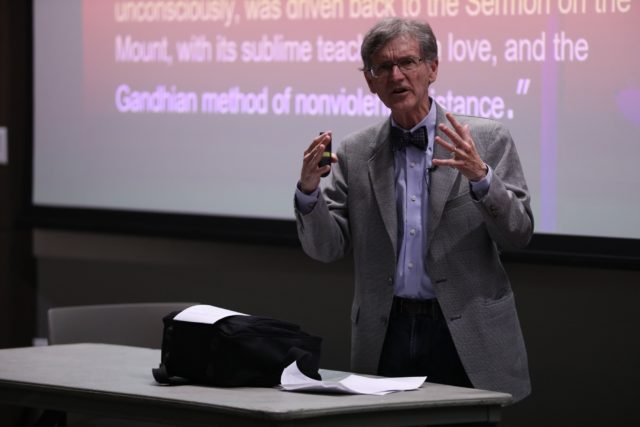By Harry Rowe | Staff Writer
Those in the minority must always be protected and be able to speak out against injustices, according to Dr. Bill Leonard, founding dean and professor at the School of Divinity at Wake Forest University.
Leonard gave a lecture titled, “Teaching Dissent — The Witness of the Minority,” at 3:30 p.m. Monday afternoon in Hankamer. The talk was open to the public and followed a workshop among faculty discussing the love of teaching.
Dissent, according to common definition, is about going against a certain philosophy or idea. Leonard talked about recent topics, beginning with a message transcribed from a sexual assault victim’s words to Sen. Jeff Flake from Arizona. Flake was confronted in an elevator going to work someone that pleaded that they had been a victim of sexual assault, and they hadn’t told anybody. They told Flake that he was showing that he didn’t believe women, and that he was “telling all women in America, that they don’t matter,” according to Mariah Gallagher, the woman.
The room was silent for a second before Leonard asked the audience to say the words on the screen out loud. As soon as the crowd was asked to say Gallagher’s words aloud, the crowd recounted one woman’s words of her experiences that she hadn’t told anybody.
“You’re telling all women that they don’t matter, that they should just stay quiet because if they tell you what happened to them, you’re going to ignore them,” the room read out loud. “That’s what happened to me, and that’s what you’re telling all women in America, that they don’t matter, they should just keep it to themselves.”
Leonard said this was the public dissent of the minority, happening live right in the United States Capitol elevator.
“The Kavanaugh saga prompted a group of Yale students to stage a sit-in calling for investigation for sexual misconduct against Kavanaugh, a Yale alumnus,” Leonard said.
These, he argued again, were the dissenting minority, a voice that burned and needed to be heard. He also mentioned Reverend Dr. William Barber, who got arrested for protesting at the national offices of McDonalds for the minimum wage in Chicago on the same day he received his grant for over $600,000 from the McArthur Foundation. Dr. William Barber, the pastor, urges Americans, particularly religious ones, to become the moral deliberators of their time. This, Leonard explained, was another example of the smaller voice speaking out for injustices they see and being willing to fight for them.
He had the room read the screen several times, saying direct quotes from people like the sexual assault survivor to Martin Luther King Jr. and Martin Luther of the protestant reformation for some quotes, one about how the nature of dissent is unavoidable.
“Today we acknowledge that dissent, often with religious implications, is not only present but also essential in a democracy. So we ask, can dissent be taught? And if so, can it be learned?” Leonard asked.
Leonard talked about the several historically altering figures such as Rev. Martin Luther King fighting for civil rights in Alabama or Martin Luther during the protestant reformation, where he argued against the need for religious authorities like the Pope. He additionally mentioned that Baptists have their roots in standing up for religious freedom, as they wanted to let people live as they pleased.
They did not believe they held the authority to punish people on earth, according to Leonard. That was up to God. However, as time goes on, the oppressed slowly become the oppressors. The same churches that wished to have their own religious freedom in England became the same churches that had mandatory church attendance laws in America. Leonard argued that the dissent and call for change is what keeps progress moving forward. Recognizing your conscience and speaking up for injustice is the right thing to do, according to Leonard.
Dr. Mikeal Parsons, professor and Macon Chair in religion at Baylor, studies pedagogy and how people teach.
“One of the things we were looking at today is is there such a thing as Baptist pedagogy, that is there anything out of the Baptist tradition that should inform the way we teach, so we wanted to have somebody to come in that could talk to us about Baptist distinctives, and Dr. Leonard is the premiere Baptist historian in the United States.” Parsons said.



